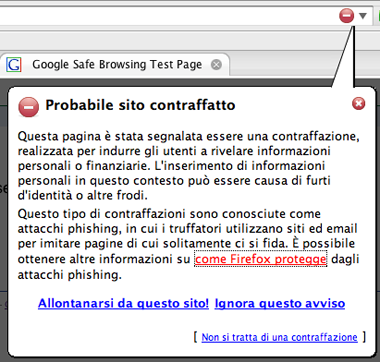Dettagli sulla protezione anti-phishing di Firefox 2
28 Ottobre 2006
Asa Dotzler sul suo blog risponde polemicamente a un articolo pubblicato su Platinax Small Business News in cui si accusa Firefox di non garantire la privacy degli utenti.

Tralasciando le discussioni sull’inconsistenza dell’articolo, dal post di Asa emerge un dettaglio interessante: la lista locale di siti “pericolosi” si aggiorna automaticamente ogni 30/60 minuti, garantendo una protezione più che sufficiente per gli utenti ed escludendo la necessità di ricorrere a servizi online come Google.
In questo modo nessun dato viene scambiato con soggetti terzi (neppure con Mozilla), per cui la vostra privacy è garantita.
Firefox phishing protection offers users protection from online identity and credential scams by checking the visited sites against a local list of known bad sites. This list of bad sites is refreshed regularly by Firefox — every 30 to 60 minutes. At no time are the users’ visited sites shared with any third parties (or even with Mozilla) when using this feature in it’s default, and quite capable, configuration.
If a user wants to make a slight improvement to the feature — eliminating the 30 to 60 minute lag time between when a site is identified as bad and when Firefox gets the updated list, the user can dig deep into the preferences and find the option to do a “real-time” compare with the most up to date list at Google’s server. If the user does check that box, she will be presented with a plainly worded description of what that means, including links to the applicable privacy policies.This real-time compare is an optional enhancement to the phishing protection feature and is absolutely not required for the feature to provide real benefit to users. There are legitimate privacy concerns any time user data is shared with service providers and that is why this enhancement to the phishing protection feature is not enabled by default.
Non è possibile inserire nuovi commenti. I commenti vengono disattivati automaticamente dopo 60 giorni.